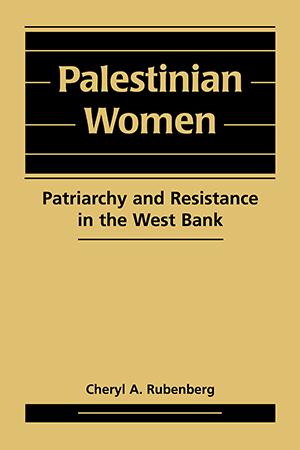Cheryl A. Rubenberg
Cheryl Rubenberg's richly textured analysis provides a case study of the multifaceted and deleterious effects of patriarchy among Palestinians living in the rural villages and refugee camps of the West Bank: its negative consequences for men as well as women, for democratization, and for progress toward the creation of a more just, equitable, and prosperous society.
Privileging the voices of her interviewees, Rubenberg reveals how external social factors—dispossession, occupation, poverty—have combined with internalized family and kinship structures to exacerbate gender inequalities and women's subordination. Equally important, she also highlights women's successes as they devise strategies to meet the challenges they confront daily.
The late Cheryl A. Rubenberg was an independent analyst and former associate professor of political science at Florida International University.
"This is an insightful book required for understanding the micro/macro link of gender repression and resistance. Coincidentally, it is timely for understanding the situation of another group—the village and refugee women of Afghanistan—who live in a similar contextual setting."—Shanin Gerami, Gender & Society
"[A] fine and beautifully crafted study.... Rubenberg has opened a door into a critical segment of Palestinian society few have entered and has given voice to women who are rarely heard within their own societies, let alone beyond them.... A powerful, moving, and, at times, disturbing portrayal of Palestine's poorest and most oppressed women.... A welcome and much needed contribution to the discourse on Palestinian women and to understanding the larger conflict in which they and their families find themselves embroiled."—Sara Roy, American Political Science Review
"A refreshing departure.... an antidote to works that have focused on a narrow segment of élite urban women, neglecting the vast majority living in rural areas and refugee camps."—Lisa Taraki, Middle East Journal
"Never before have the actual voices of rural village and refugee camp women been used as the centerpiece. This is an original, theoretically grounded, and empirically and historically contextualized study."—Samih Farsoun
"A groundbreaking interdisciplinary investigation.... Palestinian Women constitutes a major contribution not only to Middle Eastern social studies, but also to women's liberation in Palestine and the Arab world."—Hisham Sharabi, Georgetown University






